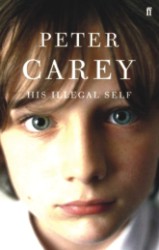|
Book Review
Peter Carey, the outback Dickens
John Preston
 There's a dangerous-sounding claim on the proof copies of Peter Carey's new novel. The book, proclaims the blurb confidently, 'may make you cry more than once'. In fact, His Illegal Self didn't make me cry - quite. However, it did leave me feeling emotionally battered and brimming with admiration. There's a dangerous-sounding claim on the proof copies of Peter Carey's new novel. The book, proclaims the blurb confidently, 'may make you cry more than once'. In fact, His Illegal Self didn't make me cry - quite. However, it did leave me feeling emotionally battered and brimming with admiration.
Set in 1972, it follows seven-year-old Che, the son of a pair of Sixties revolutionaries - Che is never quite sure which hard cluster of initials represents his parents' particular underground group.
With both his mother and father on the run, Che has been brought up by his Upper East Side grandmother, who has prudently renamed him Jay. Then one day his mother turns up and effectively kidnaps him. As they run into the New York subway, 'hand in hand, slippery as newborn goats', Che feels 'his entire life changing all at once'.
Soon, Che believes, he will meet his father for the first time - he's only ever seen one photograph of him in a newspaper and has never been allowed to watch television for fear that he might see his parents on the news. But it swiftly becomes clear that in his new life nothing is certain. Why does his mother refuse to let him call her Mom, snappishly insisting that he address her as 'Dial' - ominously, this turns out to be short for dialectic?
Why does she take him off to Australia to live in a rotting cabin in the woods with a bunch of deadbeat hippies? And, most importantly, is she actually his mother at all?
What's evident right from the start here is how vividly, and tenderly, Carey has inhabited his central character. Immediately, one is plunged into Che's head as he struggles to make sense of this great swirl of alien impressions that's suddenly engulfed him: the running woman 'with her titties like puppies fighting inside her shirt', the mysterious man with 'watery grey eyes', who hoses him down after he poops his pants and who might just be his father…
At the heart of the book is Che's yearning to belong to someone, and his mounting fear that he might be forging the most important relationship of his life with an impostor.
His only other comfort comes from the tiny kitten that he adopts - but then the moronic Australian hippies insist he gets rid of it, claiming that it's destroying the wildlife in their mouldy would-be Eden. But Che is not the only one who's flailing around for someone to love: Dial is equally lost.
An infuriatingly bumptious whinger in many respects - she's always banging on about how clever she is and how big a sacrifice she has made - Dial is none the less determined to do her best for Che, and her attempts to do so represent her own (belated) passage to maturity. Like him, she is paying the human cost of other people's idealism.
There are allusions to Huckleberry Finn here - Che reads it as part of his haphazard self-education and, like Finn, he also 'lights out' for freedom at one point. But it's Dickens who hovers most discernibly over His Illegal Self.
Carey has always been a great Dickens admirer and there are times when his ability to empathise with a small child recalls, and comes close to matching, David Copperfield. There is, however, none of Dickens's sentimentality on show - this despite Che's relationship with his pet kitten. Instead, Carey manages to get right to the heart of his desperation without it ever feeling forced or cloying.
As is often the case with Carey, his coherence occasionally falters in a characteristically tumbling narrative, but the quality of the writing always shines through.
Consistently he comes up with images that are both dramatic and unexpected, as when Che, spying on Dial and another hippy, and apparently about to learn the secret of his parentage, is described as follows: 'His own breath was held like a crumpled milk carton in his bony chest'.
The result is a richly absorbing novel which can be relished for the beauties of its prose and the pertinence of its themes, as well as for the progressively taut pull that it exerts on the emotions.
This review first appeared in The Telegraph.
Copyright
(R) thedailystar.net 2007
|
